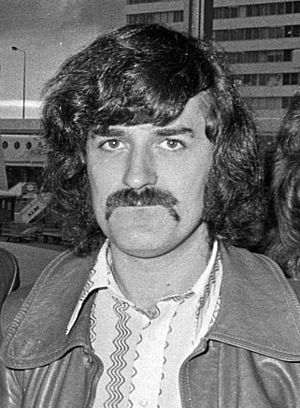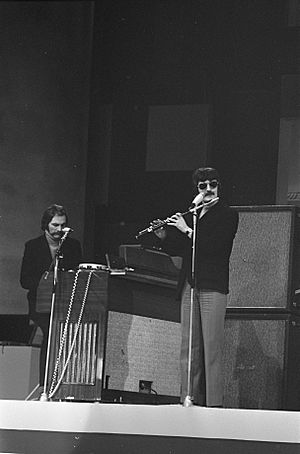Ray Thomas facts for kids
Quick facts for kids
Ray Thomas
|
|
|---|---|

Thomas in 1970
|
|
| Born |
Raymond Thomas
29 December 1941 Stourport-on-Severn, Worcestershire, England
|
| Died | 4 January 2018 (aged 76) Surrey, England
|
| Occupation | |
| Musical career | |
| Genres |
|
| Instruments | Flute, vocals |
| Years active | 1960–2018 |
| Labels | |
| Associated acts |
|
Raymond Thomas (born December 29, 1941 – died January 4, 2018) was an English musician. He played many instruments, sang, and wrote songs. Ray was a founding member of the English rock band The Moody Blues. His famous flute solo on the band's 1967 hit song "Nights in White Satin" is still loved today. In 2018, after he passed away, he was added to the Rock and Roll Hall of Fame as a member of The Moody Blues.
Contents
Ray Thomas's Music Journey
Early Life and First Bands
Ray Thomas was born in a special maternity unit during World War II in Stourport-on-Severn, England. His family came from Wales. His grandfather was a miner who later became a carpenter.
Ray's father taught him to play the harmonica when he was nine. This started his love for music. A year later, he joined the school choir. At 14, he left school and worked for a short time as a toolmaking trainee. By 16, he was looking for a music band. Within two years, he decided to become a full-time musician.
In the 1960s, Ray joined the Birmingham Youth Choir. He then sang with different blues and soul groups in Birmingham. He learned to play the flute because his grandfather also played it. Ray started a band called El Riot and the Rebels with his friend John Lodge, who played bass. Later, their friend Mike Pinder joined them on keyboards. In 1963, their band even opened for The Beatles! Ray and Mike later played in a band called Krew Cats, performing in Hamburg, Germany.
Joining The Moody Blues

Ray Thomas and Mike Pinder then formed a new band called The Moody Blues. They invited guitarist Denny Laine, drummer Graeme Edge, and bassist Clint Warwick. The band signed with Decca Records. Their first album, The Magnificent Moodies, had a big hit song called "Go Now". It reached No. 1 in the UK. Ray sang lead on some songs, and his flute was featured on others.
When Clint Warwick and Denny Laine left the band, Ray suggested his old bandmate John Lodge join as the new bassist. They also found Justin Hayward to be the new guitarist. With this new lineup, The Moody Blues released seven successful albums between 1967 and 1972. They became famous for their unique orchestral sound.
At first, they tried to keep playing cover songs. But their fans wanted to hear their own music. So, the band decided to focus only on writing their own original songs.
Ray Thomas started writing songs too, just like Mike Pinder, Justin Hayward, and John Lodge. His first songs for the group were "Another Morning" and "Twilight Time" on the 1967 album Days of Future Passed. This album is seen as a very important album in rock history. Ray's flute solo on the song "Nights in White Satin" is one of its most famous parts. His flute became a key part of the band's sound. Ray even said he wrote some of his songs in a small studio closet!
Ray and Mike Pinder often introduced the band on stage. You can hear this on their live album Caught Live + 5. Ray wrote more songs for the band, like "Legend of a Mind" and "Dr. Livingstone, I Presume". He also co-wrote "Are You Sitting Comfortably?" with Justin Hayward.
The Moody Blues even started their own record label called Threshold Records. Their first album on this label was To Our Children's Children's Children in 1969. Ray wrote and sang "Floating" and "Eternity Road" on this album.
The band later decided to record songs that were easier to play live. This led to their album A Question of Balance, which was their second UK No. 1 album. Ray wrote and sang "And the Tide Rushes In" for this album.
The Moody Blues then returned to their big, orchestral sound with Every Good Boy Deserves Favour. This was their third UK No. 1 album. Ray wrote and sang "Our Guessing Game" and "Nice to Be Here". The final album from this main period was Seventh Sojourn, which was their first album to reach No. 1 in the USA. Ray wrote and sang "For My Lady" on this album.
Solo Work and Band Breaks
The Moody Blues took a break in 1974. During this time, Ray released two solo albums: From Mighty Oaks (1975) and Hopes, Wishes and Dreams (1976). This is when he got the nickname 'The Flute'. His friends in the band also called him 'Tomo'.
The band got back together in 1977 for the album Octave, released in 1978. Ray contributed songs like "Under Moonshine" and "I'm Your Man". The group continued to release albums in the 1980s. Ray's songs "Veteran Cosmic Rocker" and "Painted Smile" were on the album Long Distance Voyager. "Veteran Cosmic Rocker" became a kind of theme song for Ray.
Later Years and Retirement
As the band's music changed to a more electronic sound, Ray's role in the studio became smaller. He was also not feeling well. He still sang backing vocals on some albums, but his flute was used less.
On The Moody Blues' 1991 album Keys of the Kingdom, Ray played a bigger role again. He wrote "Celtic Sonant" and co-wrote "Never Blame the Rainbows for the Rain". However, his health continued to decline. His last album with the group was Strange Times, where he contributed his final song for the band, "My Little Lovely".
Ray Thomas officially retired from the band at the end of 2002. His bandmate Graeme Edge said in an interview that Ray retired because of an illness called cerebellar ataxia. This condition affects balance and made it impossible for him to perform.
In his later years, Ray still played the flute with other musicians. He played on a song for the Italian band Syndone in 2016. He also played flute on "Simply Magic" on John Lodge's 2015 album 10,000 Light Years Ago.
Passing Away
Ray Thomas passed away on January 4, 2018, just six days after his 76th birthday, at his home in Surrey. The official announcement did not state the cause of his death.
His bandmate John Lodge shared his sadness, saying, "Ray was my best pal. We were two young kids from Birmingham who were reaching for the stars — and I think we got there." John was also happy that Ray knew they would be added to the Rock and Roll Hall of Fame before he passed.
Ray Thomas was added to the Rock and Roll Hall of Fame as a member of The Moody Blues in April 2018.
Instruments Ray Played
Ray Thomas was a very talented musician who played many instruments. While he was most famous for the flute, he also played the piccolo, oboe, harmonica, and saxophone. On the album In Search of the Lost Chord, he even played the French horn. He often played the tambourine and shook maracas during the band's early days.
Solo Albums
- From Mighty Oaks (1975)
- Hopes, Wishes and Dreams (1976)
Some Songs Ray Thomas Wrote
Ray Thomas wrote many songs for The Moody Blues and for his solo albums. Here are a few examples:
- For The Moody Blues: "Another Morning", "Twilight Time", "Legend of a Mind", "Dear Diary", "And the Tide Rushes In", "For My Lady", and "Veteran Cosmic Rocker".
- For his solo albums: "From Mighty Oaks", "Hey Mama Life", and "In Your Song".
See also
 In Spanish: Ray Thomas para niños
In Spanish: Ray Thomas para niños
 | Aaron Henry |
 | T. R. M. Howard |
 | Jesse Jackson |

